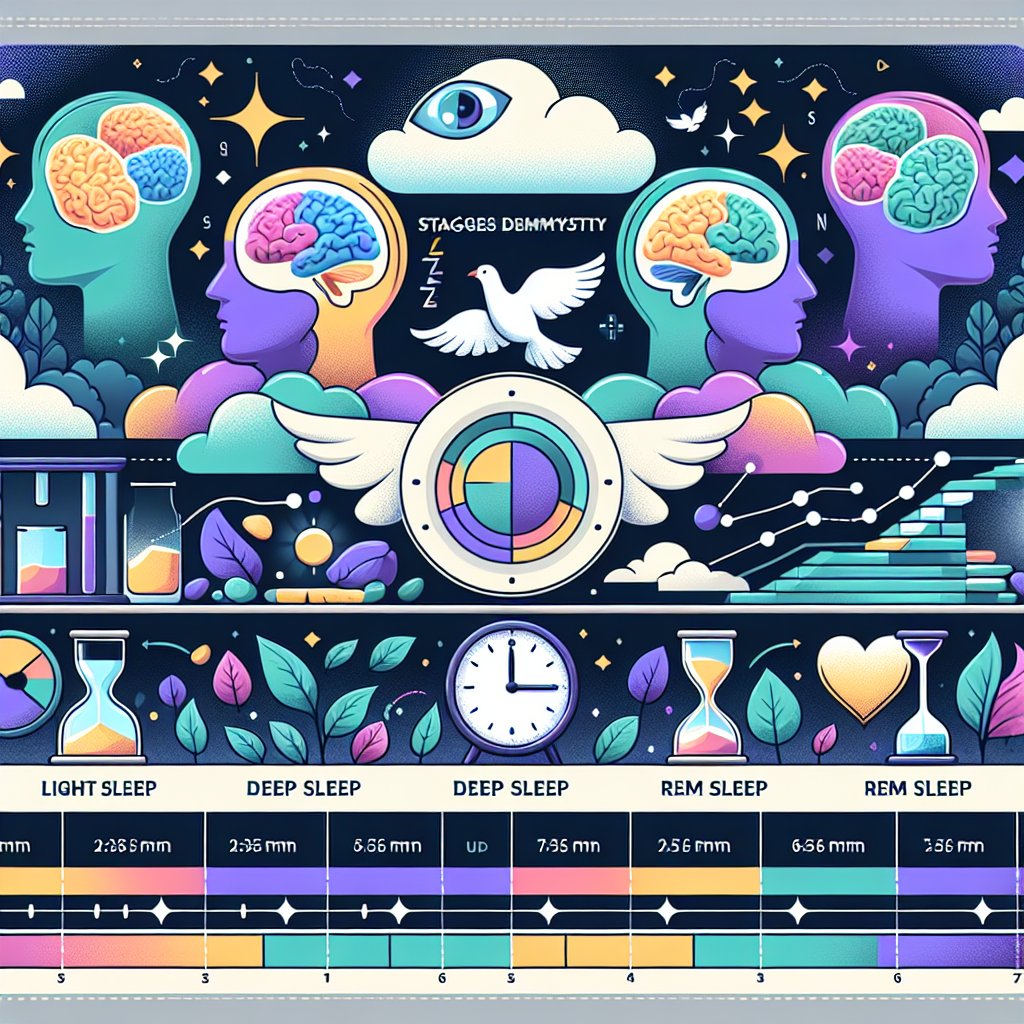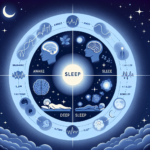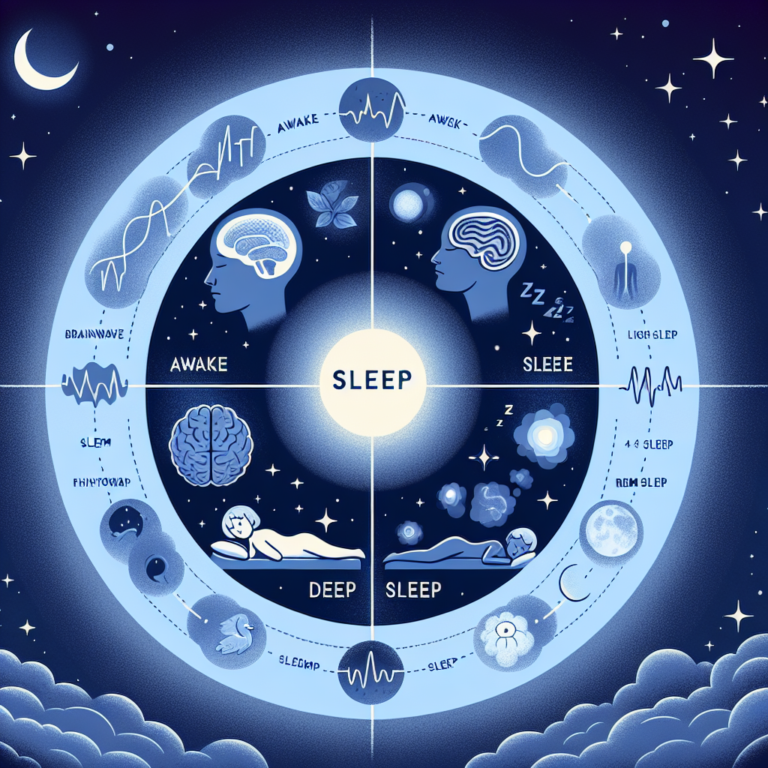
Sleep Stages Demystified: How They Impact Your Health and Well-being
Introduction
In our fast-paced world, sleep is often neglected, yet it’s a vital cornerstone of health and well-being. Have you ever woken up groggy or foggy-headed after what you thought was a full night’s rest? Many of us have. Understanding the intricacies of sleep stages can shed light on these experiences and help us harness the restorative powers of better sleep. In this article, we delve deep into Sleep Stages Demystified: How They Impact Your Health and Well-being. From REM to non-REM sleep, each stage plays a critical role in our overall health, mood, and cognitive performance.
The Science of Sleep: An Overview
Sleep is not just a passive state; it is an active process with multiple stages that our bodies cycle through. Each of these stages serves unique functions that contribute to physical and mental health. In total, sleep is classified into two primary types: Non-REM (NREM) and REM sleep.
Understanding Sleep Cycles
A typical sleep cycle lasts about 90 minutes, and within that cycle, we progress through several stages:
- Stage 1 (Light Sleep)
- Stage 2 (Moderate Sleep)
- Stage 3 (Deep Sleep)
- Stage 4 (REM Sleep)
The Stages Explained
| Stage | Duration | Characteristics | Role in Health |
|---|---|---|---|
| Stage 1 | 5-10 minutes | Transition from wakefulness to sleep | Brain activity slows; muscle relaxation begins |
| Stage 2 | 20-30 minutes | Body temperature drops; heart rate slows | Critical for memory consolidation and learning |
| Stage 3 | 20-40 minutes | Deep sleep, difficult to awaken | Physical restoration; growth hormone is released |
| Stage 4 | 10-20 minutes | REM sleep; intense brain activity | Dreaming occurs; vital for emotional regulation |
The Importance of Each Sleep Stage
Stage 1: The Gateway to Sleep
Stage 1 functions like a gentle push into the world of sleep. This initial phase allows our bodies and minds to begin the transition towards restorative sleep. Although it only lasts a few minutes, it sets the stage for deeper and more fulfilling sleep experiences.
Stage 2: Memory and Learning
Stage 2 occupies a substantial portion of our sleep cycle. It plays a crucial role in memory consolidation, helping us absorb and retain new information. A case study involving university students showed that those who achieved more Stage 2 sleep performed significantly better on exams compared to their counterparts who experienced disrupted sleep patterns.
Stage 3: The Healing Phase
Stage 3 and the later parts of sleep are often referred to as deep sleep or slow-wave sleep. This is when physical healing occurs—muscles repair, tissues grow, and energy is restored. A noteworthy case study demonstrated that athletes who prioritized deep sleep improved their performance in competitions.
Stage 4: The Dream Factor
Rem sleep, where most dreaming occurs, is vital for cognitive functions such as problem-solving and emotional regulation. A fascinating exploration into individuals who frequently recall dreams revealed that they often exhibited higher levels of creativity and emotional intelligence than those who reported little to no dream recall.
How Sleep Stages Affect Your Health
The Connection Between Sleep Stages and Mental Health
Research underscores the connection between sleep, especially REM sleep, and mental health outcomes. Individuals suffering from conditions like anxiety and depression often report disrupted sleep patterns. One striking study followed a group of adults undergoing cognitive behavioral therapy for depression, revealing that improvements in their sleep stages were closely aligned with their reductions in depressive symptoms.
Sleep Stages and Physical Health
Poor sleep quality is also linked to a range of physical health issues, including obesity, diabetes, and cardiovascular disease. Individuals who frequently miss out on deep sleep are more likely to experience inflammation, a key contributor to these health crises.
Illustrative Case Study: A Compelling Link
Consider the case of an adult with chronic insomnia. After undergoing a sleep study, the individual was found to be lacking significant amounts of REM and deep sleep stages. Simple adjustments to their nighttime routine, including consistent sleep schedules and decreased screen time, led to notable improvements in their sleep quality. Subsequent follow-ups indicated a marked improvement in their physical health markers, including reduced blood pressure and stress levels.
Strategies for Optimizing Your Sleep Stages
Understanding Sleep Stages Demystified: How They Impact Your Health and Well-being extends beyond knowledge—it’s about actionable strategies to enhance your sleep. Utilize the following recommendations to optimize your sleep routine:
Establish a Regular Sleep Schedule: Consistency is key. Go to bed and wake up at the same time every day to strengthen your circadian rhythms.
Create a Sleep-Friendly Environment: Ensure your bedroom is dark, quiet, and at a comfortable temperature to promote uninterrupted sleep.
Limit Screen Time Before Bed: Blue light from devices can interfere with melatonin production, which is essential for achieving deep sleep stages.
Incorporate Relaxation Techniques: Activities such as meditation, yoga, or reading can help lower stress and prepare your body for restorative sleep.
- Be Mindful of Food and Drink: Avoid large meals, caffeine, and alcohol in the hours leading up to sleep. These can disrupt sleep cycles and prevent you from reaching deeper sleep stages.
Sleep Hygiene Practices Table
| Practice | Benefits |
|---|---|
| Consistent Sleep Schedule | Reinforces circadian rhythms |
| Dark, Cool Room | Promotes optimal sleep hormone regulation |
| Limiting Blue Light | Enhances melatonin production |
| Relaxation Techniques | Reduces stress and anxiety |
| Mindful Eating | Prevents sleep disruptions |
Conclusion
In our exploration of Sleep Stages Demystified: How They Impact Your Health and Well-being, we come away with invaluable insights into the importance of sleep stages. By understanding the role each stage plays in our lives, we can significantly enhance our health and overall well-being. Prioritizing quality sleep isn’t just an act of self-care; it’s a necessity for a thriving life.
Whether you’re a student, a professional, or someone seeking better health, implementing the strategies mentioned can transform your sleep experience and, consequently, your life. Remember: every hour spent in deep REM sleep doesn’t just reconstruct your body; it revitalizes your spirit.
FAQs
What are the different sleep stages?
- Sleep stages can be categorized into Non-REM (Stages 1-3) and REM sleep, each serving critical rejuvenating functions.
How long do sleep cycles last?
- A full sleep cycle typically lasts about 90 minutes and includes stages of light sleep, deep sleep, and REM sleep.
Why is REM sleep important?
- REM sleep is crucial for cognitive functions, emotional regulation, and creativity. It helps consolidate memories and manage emotional responses.
How can I improve my deep sleep?
- Establish a consistent sleep schedule, create a comfortable sleep environment, and engage in relaxation techniques.
- Can stress affect my sleep stages?
- Yes, stress can disrupt sleep cycles and reduce the proportion of restorative deep and REM sleep, negatively impacting both mental and physical health.
By taking actionable steps to understand and optimize your sleep stages, you’ll be well on your way to enjoying the many health benefits of quality sleep. Prioritize it—your body will thank you!

















